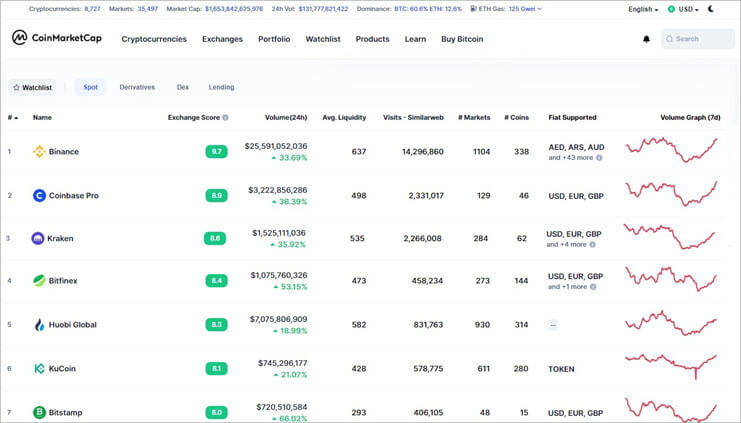
Phemex, an innovative cryptocurrency exchange, is at the forefront of a hybrid trading approach. Backed by an unwavering commitment to decentralization, Phemex offers CEX-like liquidity, easy-to-use features and access to DeFi capabilities through its Phemexia ecosystem.
Cryptocurrency trading platforms have come a long way over the years, from the Bitcoin Market exchange owned and operated by an anonymous user, dwdollar, in 2010, to automated market makers (AMMs) that rely on mathematical formulas to valuation of a decade of cryptocurrency assets. . . Later.
Centralized exchanges (CEX) manage an order book in which market makers and buyers place their orders. Their order books are then matched with buyers and sellers, and the exchanges take a small portion of the transaction as a commission. Their counterparts, decentralized exchanges (DEX), operate via smart contracts: autonomous pieces of code on the blockchain that execute transactions. And users pay gas for their online activity.
However, there are already trading platforms that combine the functions of CEX and DEX and are called hybrid trading models. For example, Phemex is one of the leading platforms that offers a hybrid and semi-centralized trading structure.
The rise of centralized and decentralized crypto exchanges
As different as CEX and DEX may seem from a modern perspective, their evolutionary timelines have repeatedly overlapped, making these exchange models inseparable from each other in a historical context.
In 2012, the first regulatory issues began to emerge, prompting the founders of centralized exchanges to implement Know Your Customer (KYC) and Anti-Money Laundering (AML) policies. Over the years, due to the continued emergence of restrictions and decreasing levels of anonymity in the cryptocurrency space, early DEXs such as EtherDelta and IDEX have gained traction.
When the world witnessed the explosion of initial coin offerings (ICOs) in 2017, there were already large centralized platforms like Binance or Bitfinex that housed all the new tokens and built a reputation for themselves. But despite this popularity, cryptocurrency traders are increasingly concerned about KYC, centralized storage of their funds and potential hacker attacks. The decentralized finance (DeFi) boom of 2020-2021, with a total locked-in value (TVL) of $250 billion as of November 2021, was a strong response to the worrisome tensions that had been slowly building in the crypto community for years .
However, as time passed, more and more breaches began to occur in the DeFi sector. Therefore, some crypto projects have started to invest time and effort in researching alternative trading models. Thus was born the semi-centralized market model, which combines many advantages, including CEX security measures and general lack of censorship for DEXs.
So what else can a semi-centralized model bring to the crypto community?
How do hybrid exchange models work?
The hybrid exchange model is not yet widely used in the niche. However, Phemex, a cryptocurrency trading platform, is a pioneer in adopting a semi-centralized approach to its operations.
Phemex offers its users the benefits of CEX, such as reliable liquidity, an intuitive user interface and flexible market entry and exit options. In April 2023, the exchange announced its move towards decentralization and introduced its Web3 Phemexia ecosystem, where Phemex Soul Pass non-tradable token holders can unlock DeFi possibilities.
To be able to create their own PSP, users must have a trading volume of at least $10,000 in the last 30 days. But once issued, the pass allows them to collect spins of xPT, the exchange's next native token. Users can also propose and vote for platform development on Phemex DAO, participating in platform development, operations, financial management and external partnerships.

Source: Femex
Phemex offers Phemex Soul Pass holders a variety of opportunities and activities to get the most out of their tokens on its DeFi platform. One of these events is happening now. In honor of Satoshi Nakamoto, who introduced Bitcoin (BTC) on October 31, 2008, Phemex hosted a major event dedicated to the world of digital gold. PSP owners are invited to predict the Bitcoin price range on October 31, 2023. Participants who make correct predictions will have the opportunity to share in the BTC prize pool, which can be up to 1000 BTC.

Source: Femex
This campaign represents the latest significant benefit offered to PSP owners following Phemex's 100 Ether (ETH) donation in August. It highlights Phemex's commitment to providing tangible benefits to its dedicated community of followers while recognizing outstanding cryptocurrency projects.
Disclaimer. Cointelegraph does not endorse any content or products on this site. If our object is to be the most important amount of important information possible in this authoritative article, readers should understand their own investigation before their action regarding the company and take full responsibility for their decisions and this article. should not be interpreted as Advice. investments. .

